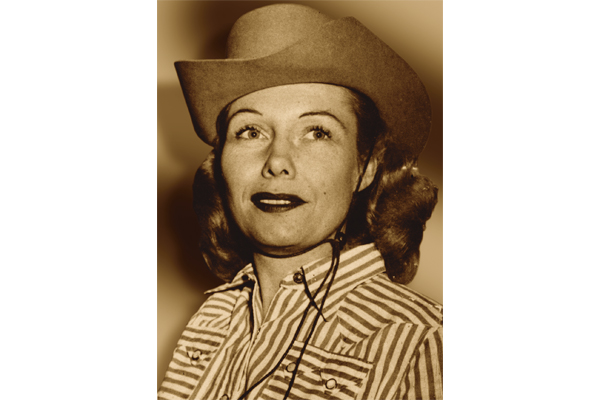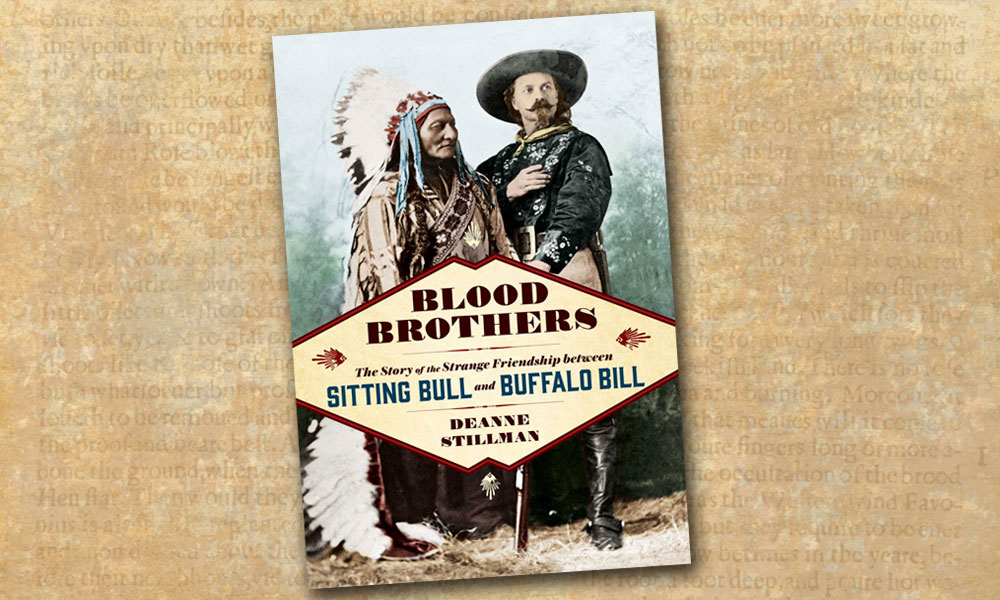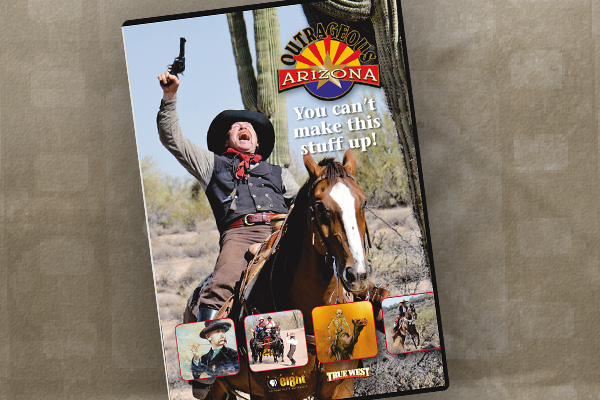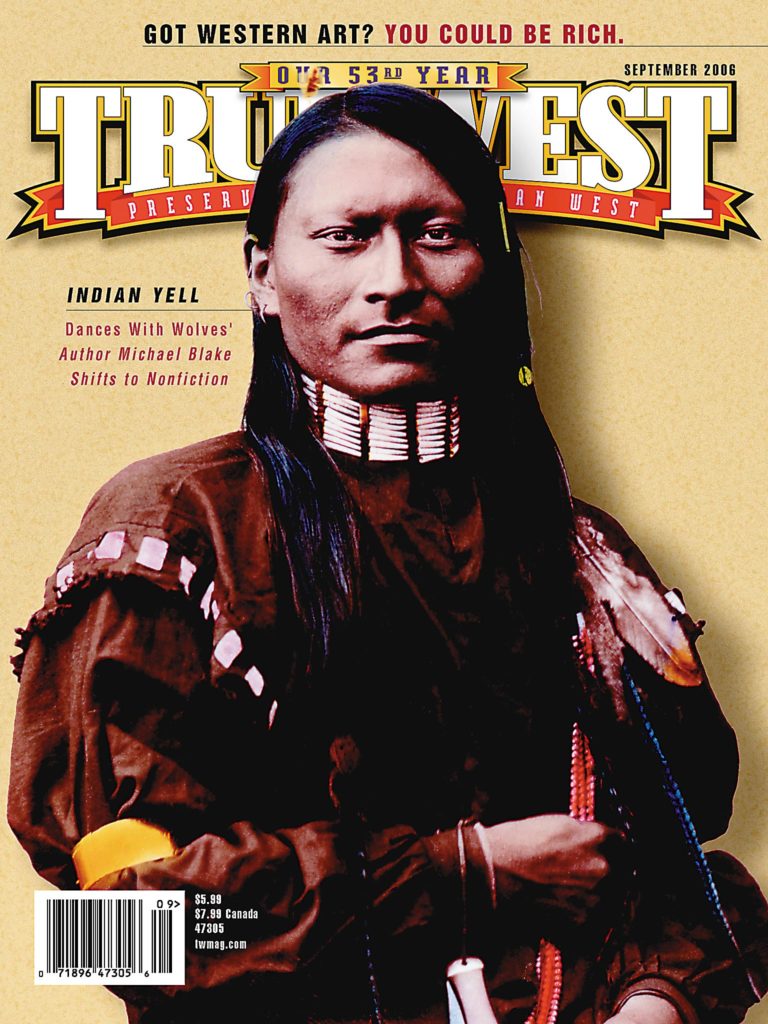 She was the original Rhinestone Cowgirl—a lady who believed “it is always better to be looked over, than to be overlooked.”
She was the original Rhinestone Cowgirl—a lady who believed “it is always better to be looked over, than to be overlooked.”
And she held onto that motto to the end on April 7, 2006. Her obituary in The New York Times, announcing the death of “the purveyor of glitter,” was a showstopper: There she was, at 92, in a floor-length beaded skirt, a bandanna around her neck, a rifle in one hand and her walker at the ready. One look at that picture and you just had to know more about the woman known as Bobbie Nudie.
This series on Women of the West has included a lot of heroines and characters, all with an eye toward women who made a difference in the West or made the West different. But it’s never featured someone quite like Bobbie Nudie, a modern woman who was instrumental in creating the image of the Western superstar. She and her husband designed the glittery, spangled look that made the stars shine.
Those in the know recognize her name as the trademark of the best, most rhinestone-studded outfits ever worn by Western icons. The “Nudie” label has marked the most fabulous clothes worn by everyone from Hank to Roy, Elvis to Elton. It’s said that some of America’s Western legends wouldn’t be dressed in anything less than a Nudie. And it’s hard to find a name worthy of Western fame who hasn’t had at least one Nudie in the closet: John Wayne, Johnny Cash, Steve McQueen, Tex Williams (who once sold a horse to buy a sewing machine for the label), Buck Owens, Clint Eastwood. Customers also included Cher, Liberace and John Lennon.
While not every outfit matched the $10,000 gold lamé suit made for Elvis Presley in 1957—the outfit that rocketed Nudie Cohn and his wife, Bobbie, to stardom—every garment made by these “rodeo tailors” was special.
So were the people behind the label that has become a major Western collectible.
Nudie Cohn was born in Kiev, Ukraine, in 1902 and immigrated to the U.S. as a boy. From the start, he had his eyes on stardom and showbiz, so he probably didn’t balk when an official at Ellis Island couldn’t understand his Russian name—Nuta Kotlyarenko—and instead named him Nudie Cohn.
In the same light, he renamed the bride he found in Mankato, Minnesota—he stayed at her family’s boarding house and fell in love with her over dinner—from Helen Kruger to Bobbie Nudie. (She was born in Mankato on July 29, 1913.)
Did the name point the way for their work? It sure seems so since the couple first opened “Nudie’s for the Ladies” in Manhattan, making beaded g-strings and lingerie for showgirls. They lived in a hotel frequented by gamblers and became friends with Pretty Boy Floyd, the Times reported.
In the early 1940s, they changed their locale and their focus, moving to California to be closer to the movie stars Nudie Cohn admired. “My grandfather loved Western films and wanted to do something never done before,” says his granddaughter, Jamie Nudie, who has written a book about him titled Nudie the Rodeo Tailor (see sidebar on p. 34).
What Nudie did that no one had ever done was attach rhinestones to clothing, making jackets, slacks and skirts that sparkled. The couple opened their first shop in their garage.
In his 81 years, Nudie Cohn became a Western celebrity himself. He wore rhinestone suits as daily attire and mismatched boots to always remind him of his humble beginnings when he couldn’t even afford a pair of boots.
When he died in 1984, his good friend and customer Dale Evans gave his eulogy.
Always at his side was Bobbie. She helped sew costumes at first, but then became “the businesswoman she was meant to be,” Jamie says. Bobbie ran the business for a half century. Or as the Times put it, she was “inspiring and managing a man who rhinestoned the stars.”
The Times’ obituary began: “Helen Cohn, whose suspicions that life could turn peculiar after she said yes to a man named Nudie were confirmed as she helped him in his life’s mission, putting lots and lots of rhinestones on country singers’ suits, died April 7 in Valencia, California.”
As Jamie describes her to True West, “My grandmother was feisty, gutsy, beautiful, very kind-hearted, loving and very family-oriented.”
She also, obviously, had a great sense of humor. Jamie confirms her grand-mother was the inspiration for the original Nudie label—a naked cowgirl wearing only a hat, boots and holster. That’s how Bobbie appeared one night from the bedroom, asking her startled husband, “When are you going to make the rest of the outfit?”
For nearly 25 years, the nude cowgirl was the calling card for the hottest selling rhinestone clothes in America. And then in 1963, Nudie converted from Judaism to Christianity and put clothes on his logo. “That’s how we date our outfits,” Jamie notes. While all are valuable—some selling on eBay or at auctions for several times their original price—the oldest ones with the nude cowgirl are the most valuable.
Bobbie and Jamie kept the Hollywood shop open for 10 years after Nudie’s death, but then Bobbie retired to spend time with her grandchildren.
“Grandma taught us family values,” Jamie says. “That means love your children no matter what grief they give you, and walk a straight and narrow line.”
She says her grandmother was “very proud” of what she and her husband accomplished in 51 years of married life. They proved “if you have a dream, you can achieve it,” she says, adding, “It was a great love story; she always stood behind him.”
Bobbie Nudie—buried in Forest Lawn Cemetery in the Hollywood Hills—was a rhinestone cowgirl who will never be forgotten.
Jamie offers this closing thought: “Every time you see a rhinestone suit with a Nudie label, remember—it’s part of history.”





